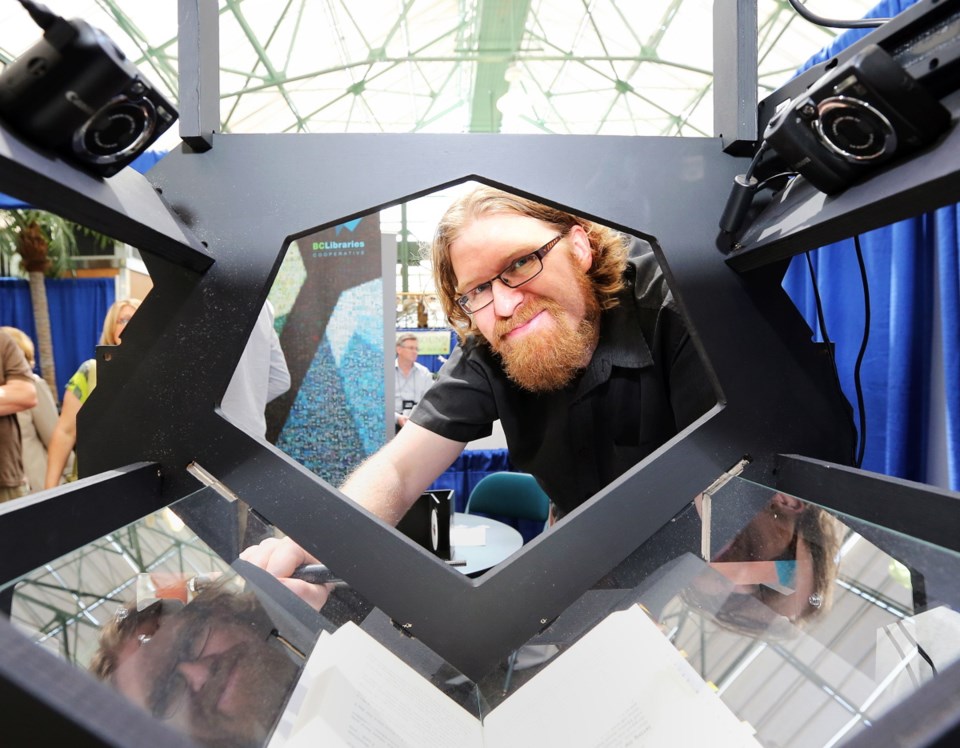Two new programs aimed at helping people unable to read traditional print books are competing for spots in local libraries now, but advocates say having both will offer the greatest benefit.
“In the long run, having more options for people who have not had much access is way better,” said Rina Hadziev, collections and technical services co-ordinator at the Greater Victoria Public Library, which has an estimated 30,000 accessible titles, including large-type books, CDs and DVDs.
The Centre for Equitable Library Access and the National Network of Equitable Library Service programs were launched at the Canadian Library Association conference in Victoria this week. Both are aimed at improving access for people who can’t read standard printed materials due to “print disabilities” such as visual impairments or learning disabilities.
CELA offers access to 230,000 items, including audio, Braille, e-text and described video, in exchange for an annual fee, while NNELS, a free provincially sponsored program, is using open-source technologies and crowdsourcing to build its collection of audio files, now at 20,000.
“Both [programs] are digitally focused but CELA does have a larger physical collection,” Hadziev said, noting some library users are not as adaptable to new technologies as others.
While the GVPL has already signed on with CELA for a $20,000 yearly fee, Hadziev said the library will ultimately offer both. The Vancouver Island Regional Library also subscribes to CELA.
At the CELA event, Victoria author Robert Wiersema spoke about how access to books shaped him as a person and as a writer. He shared how his son struggled with dyslexia to read but devoured audio books.
Eighth-grader Rachell Morton said she was excited that more large-print books would be coming to the library. Legally blind, she uses magnifying devices to help her read.
“I think it’s our basic human right to have easy access to books like normal-sighted people,” said the 14-year-old, who goes to Monterey Middle School.
At the B.C. Libraries Co-operative booth, NNELS production librarian Jonathan Kift demonstrated how simple technology can improve that access.
Kift used open-source instructions and software to build a basic book scanner out of plywood, glass and a small computer housed in a box made out of Lego. Libraries can download the plans to build their own device, then scan books and convert them to audio files with open-source software.
“You still need a human to look it over,” he said.
The files are uploaded to a program that converts them to formats such as DAISY, a type of digital talking book. NNELS can add the items to its collection for anyone in the network to access. Fair-use copyright limits access to those with print disabilities.
The main difference between CELA and NNELS is that one is a centralized hub of resources and the other is a crowdsourced network, said the co-operative’s executive director Ben Hyman.
“The provinces wanted us to look broadly at emerging technology and to the future,” he said. “Anyone across the network can create content.”
Graeme McCreath, a Victoria physiotherapist and advocate for the blind, said people with visual impairments have been waiting for years to be included in the public system and he supports the low-cost, easy-access NNELS model.
He is wary of the CELA program because he said its service provider, CNIB, a national charity serving Canadians who are blind or partially sighted, has historically been cost-heavy with few resources to show.
“It’s a holdover of the past and we’re at a transition time,” said McCreath. “Being included in the library system is the way of the future.”



